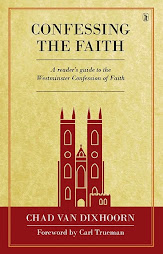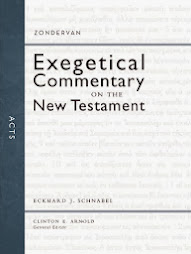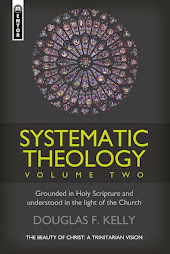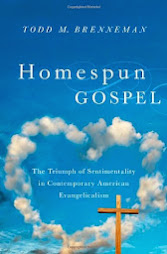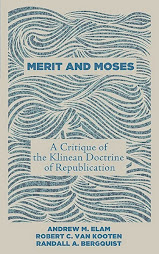Saturday, May 31, 2008
Take And Read
1. Knowing God by J.I. Packer
2. The Christian Life by Sinclair Ferguson
3. Instruments in the Redeemer's Hands by Paul Tripp
4. God's Big Picture by Vaughn Roberts
5. Putting Amazing Back Into Grace by Michael Horton
I Need The Gospel
It is in days like these that I realize how much I need to preach the gospel to myself. I need the good news every bit as much today as I did when I was lost.
"If Christ has borne my punishment, I shall never bear it. Oh what joy there is in this blessed assurance. Your hope that you are pardoned lies in this, that Jesus died. Those dear wounds of His blessed life for you. Now we know that sin crucified Christ. Now we know that we stabbed our heavenly Lover to His Heart. Oh let us bless that dear Son of God who has put away even such sins as ours! Now we see our sins, and yet we do not see it, for God has pardoned it, blotted it out, cast it behind His back forever."
- Charles Spurgeon
Thursday, May 29, 2008
Mike and Me
- Mike Tyson to the Nevada State Athletic Commission
Wednesday, May 28, 2008
We must not mind a little suffering
I often wonder why God did not give me thicker skin, as it were. I wound easily. I feel every criticism deeply. I rage against this weakness within myself. But I also know that God entrusts to us all certain reminders of our dependence upon Him. He gives us certain flaws that we might learn to daily walk in grace.
"When historians list the character traits of America in the last third of the twentieth century, commitment, constancy, tenacity, endurance, patience, resolve, and perseverance will not be on the list. The list will begin with an all consuming interest in self-esteem. It will be followed by the subheadings of self-assertiveness, self-enhancement, and self-realization. And if we think that we are not children of our times, let us simply test ourselves to see how we respond when people reject our ideas or spurn our good efforts or misconstrue our best intentions."
- John Piper
"And his faith upholds him under all trials, by assuring him that every dispensation is under the direction of his Lord; that chastisements are a token of his love; that the season, measure, and continuance of his sufferings, are appointed by Infinite Wisdom, and designed to work for his everlasting good; and that grace and strength shall be afforded him, according to his day."
- John Newton
"My dear brother, we must not mind a little suffering for Christ's sake. When I am getting through a hedge, if my head and shoulders are safely through, I can bear the pricking of my legs. Let us rejoice in the remembrance that our holy Head has surmounted all His suffering and triumphed over death. Let us follow Him patiently; we shall soon be partakers of His victory."
- Charles Simeon
Understanding the Crowd
“The crowd is so large that has been gathering over the course of this day that Jesus is required to do what a teacher must do and that is find some way to get distance from the crowd that is necessary to be seen and heard. In this case Jesus gets into a boat and goes slightly off shore in order that he might teach. The crowd is a very important factor to this passage.
The crowd is a matter of some question–some challenge, some perplexity–to us as well. Is has become clear that evangelical Christians in particular have a hard time understanding the nature of a crowd. We are tempted to think of a crowd as a great gathering of receptivity.
We understand that the crowd is gathering because something has been happening. We as evangelicals sometimes mistake a crowd for a church. It’s hard for us sometimes to understand what’s going on. Jesus helps to clarify this for his own disciples.”
–Albert Mohler, The Parable of the Sower, sermon at Covenant Life Church (Gaithersburg, MD) on May 4, 2008.
Tuesday, May 27, 2008
Regeneration and Church Membership
This is an issue that ought to concern us all. For the sake of numbers too many churches have looked the other way while unregenerate children, youth, and adults were accepted into membership. They may have "prayed the prayer," "walked the aisle," or simply signed a card but were never involved in any process by which the genuiness of their conversion might be tested. I cannot remember how many adults I have counseled with over the years who were converted as adults years after being assured of their salvation because they "prayed the prayer." Even after a life of no spiritual fruit and even ungodliness they were assured repeatedly by well meaning pastors and family members that they were okay because of the prayer they prayed as a child. I continue to encounter men and women raised in the church that hold a profoundly unbiblical worldview and demonstrate almost complete biblical illiteracy. Friends, it is time for a radical change.
"Failure to heed these warnings will result in irreparable harm to our churches. The loss of the conviction of a regenerate church membership would be the abandonment of one of our crucial theological distinctives. We would in essence forsake one of our core tenets that has classically and theologically defined us as Baptists in the free church tradition. We would erase the line of demarcation between the church and the world.
"Our churches would become more worldly and carnal and less holy and Christlike. We would witness and increase in the number of inactive, indifferent, uncommitted, and undedicated members in our churches. In our effort to have larger churches with greater numbers of members, we would contribute to the demise of effective evangelism and witness a decrease in the number of new converts. We would also lose our prophetic voice to speak with biblical convictions on the great moral and social issues of our day."
Monday, May 26, 2008
18 Years

The Thinning of Evangelicalism
"The erosion in biblical ways of thinking at first passed almost unnoticed. Nevertheless, after a while it was hard to miss the fact that this was happening. No doubt there were many specific causes. Campus organizations were undoubtedly reducing Christian faith to its most minimal form. And as serious biblical preaching in the churches diminished, ignorance of biblical truth became commonplace. But the largest factor in this internal change, I think, was that evangelicalism began to be infested by the culture in which it was living. And then Christianity became increasingly reduced simply to private, internal, therapeutic experience. Its doctrinal form atrophied and then crumbled...
"The constant cultural bombardment of individualism, in the absence of a robust theology, meant that faith that had rightly been understood as personal now easily became faith that was individualistic, self-focused, and consumer oriented. That was the change to which the church marketers attuned themselves. Instead of seeing this as a weakness to be resisted, they used it as an opportunity to be exploited. Increasingly, evangelical faith was released from any connections with the past, frome very consideration except the self, and was imbued with no other objective than entrepreneurial success. As the evangelical experience was thus cut loose, it became increasingly cultural, increasingly empty, and increasingly superficial."
from The Courage to Be Protestant by David Wells
Friday, May 23, 2008
A Third Place


Sociologist Ray Oldenburg has written about the importance of what he has termed “third places.” In Oldenburg’s thinking, our homes are “first places,” our jobs are “second places,” and “third places” are cafes, coffee shops, pubs, town squares and other places where we “hang out.” Third Places are where we go to drink coffee, read, meet friends, and have informal meetings. Oldenburg points out that, with the growth of the suburbs, third places have been disappearing in the United States. Yet there is a strong desire for the return of these places. Starbucks and Barnes and Noble have capitalized on this reality.
I cannot help but dream about what it would look like if Metro East had the vision and appropriate facilities to be a third place for our community. What if our commitment to “gospel-ish” hospitality was such that our place became our city’s place as well? How would our ministry change if our facilities did more than provide worship and education space for our members? What might happen if the people who live in the neighborhoods that surround us knew that Metro East was a place where the doors were truly open?
I have no timeline in my mind. It may be God’s will that we wait a while to proceed with any further building. But I am grateful that we have taken a first step to imagine what could be on the fifteen acres on 143rd Street.
Thursday, May 22, 2008
Blogging For a Year
- My first post focused on the Gospel as the matter of first importance.
- These two posts (here and here) received some kind words from David Black who is a professor of Greek at Southeastern Baptist Theological Seminary.
- This post helps to explain my vision for a "Gospel Driven Church".
- This one is just plain funny (or sad).
Tuesday, May 20, 2008
Today's Gospel
from Made in America by Michael Horton
Seeker-Sensitive vs. Seeker-Driven
I have been asked more times than I can remember about my thoughts on the seeker-sensitive movement within the church. For those of you who may not be familiar with the term, “seeker-sensitive” is a philosophy of church growth that arose in the 1980’s primarily through the influence of Willow Creek Community Church. In the late 80’s and early 90’s Willow Creek, lead by pastor Bill Hybels, became the largest church in the U.S. Willow Creek’s method of growth, championed by super pollster and church marketing advocate George Barna, began by asking people in the community what they did not like about church. The result was a church whose worship, preaching, and ministries reflected a sensitivity to the preferences and felt needs of the surrounding community. It has been a source of contention ever since.
Part of my problem with the Seeker-Sensitive movement is that I do not think it is aptly named. For instance, I believe every church ought to be seeker-sensitive. In other words, if seeker-sensitive means being generous and hospitable to the unconverted then count me in. If seeker-sensitive means extending compassion to those who are lost in their sins then sign me up. If seeker-sensitive means making sure that everyone who steps into our church building is warmly received and faithfully given the Word of God then let me in the club. In these ways every church and every believer ought to be seeker-sensitive. Any church that is seeker-mean-and-nasty ought to reconsider their mission.
However, if seeker-sensitive means roping in our market-niche (which, by the way always seems to be rich, white suburbanites) with one message in hopes of giving them the truth at some later date then I will have to be counted out. If seeker-sensitive means turning the corporate worship of God’s people into self-aggrandizing concerts then count me out. If seeker-sensitive means adopting Rick Warren’s recent dictum that the church does not grow through preaching and prayer then color me gone. If seeker-sensitive means a lack of reverence and absence of clear doctrinal instruction; if it means casting Christianity in therapeutic terms; if it means wasting thousands of dollars on stage props and videos then, no, I am not seeker-sensitive.
This is why I say that seeker-sensitive is not an appropriate name for the movement that has so dominated church-growth methodology over the last 25 years. A better name would be “seeker-driven” for this is what it is. It is not being merely sensitive (kind, compassionate, hospitable) to the seeker or the unregenerate. It is placing the responsibility of determining sermon content and how worship is conducted in the hands of those who know least about “the faith once for all entrusted to the saints.”
Those within the seeker-driven movement have promised all along that the only thing they change are the methods. The message, we are assured, is never tampered with. However, this clean separation of method from message proceeds from a mistaken and naïve notion that the one has little to do with the other. To the contrary, in the words of Marshall McCluhan, “The medium is the message;” a hyperbole to be sure, but one that is intentional. The point is that the message is deeply affected by the method. How we communicate a thing will impact the thing we are seeking to communicate. For instance, would a congregation’s reverence for Christ during the Lord’s Supper be impacted if the minister were dressed as a clown? Has the typical congregation’s understanding of the holiness of God been re-enforced or diminished by the focus on entertainment in the contemporary church?
Seeker-driven churches are characterized by a lack of seriousness. Theologian David Wells has written that God rests all too lightly upon the modern church. “Keep it light” we are told. “Don’t bury people with doctrine.” Not too long ago a retired Southern Baptist pastor instructed me to avoid many texts of Scripture because they will just “confuse people.” “Just give them the milk, just give them the milk,” he advised. I am afraid that the seeker-driven church has done just that.
In an atmosphere of flashing lights, stage props, fashionable crooners, edgy jokes, and light messages what is lost is all sense of gravity. The sharp edge of God’s Word is blunted and all notions of sin, if present at all, are cast in strictly therapeutic terms. There is no presentation of the terrifying law of God in all its moral intensity. Therefore, there is no concept of or revelry in the radically liberating Gospel which forms the basis of God’s stunning justification of sinners. It all gets reduced to a weightless but “practical” message of how God can help us with our problems.
The lack of gravity or weightlessness that has been cultivated in seeker-driven churches works against the Gospel. How do you tell people that they are sinners alienated from God and even hostile toward Him when your entire approach has made an unspoken contract with seekers to not bother them with such insensitive messages? How can you give your market niche the bad news when you have basically promised to not do or say anything that they do not understand or will upset them? The Gospel, the whole Gospel, will not make much sense in an atmosphere that promises comfort and fun.
If we were truly sensitive to seekers then we would not be so cruel as to give them sweet gruel when they truly need the meat of God’s Word. If we were truly seeker-sensitive then we would not lie and tell them that Jesus will fix all their problems and following Jesus is “fun.” If we were seeker-sensitive then we would make sure that we not mislead them with diminished “gospels.” If we were seeker-sensitive then we would not pander to their unregenerate desires. Instead, we would say to them, “We are so glad you are here. It’s not a mistake because God is sovereign. This morning you will see and hear some things that may be pretty new to you. We will sing some songs about the deep truths of God. We are also going to go deep into God’s Word. It’s okay if you don’t understand everything that happens. We’re just happy that you came and we are confident that God has something very precious to give you this morning.”
The Moral Blindness of Barack Obama
Okay, I'm laying my cards on the table. Christians should not vote for Barack Obama. Those of you who know me know that while I do speak to political issues I am very careful not to endorse any candidates or use my pulpit for political causes. But we know that the world of politics is not divorced from the world of morality. In this video, as elsewhere, Barack Obama demonstrates his utter moral blindness. He is not fit to lead anyone much less a nation.
God does not owe America anything better than Barack Obama. We know that it is God who establishes a nation's leaders. God's purposes are at times to bless and at other times to judge. If Obama becomes our next president then it will be time for Christians to grieve.
Monday, May 19, 2008
Great Stuff on Marriage
Saturday, May 17, 2008
Interesting
Any thoughts?
Friday, May 16, 2008
Galatians and Justification
The Church's Greatest Need (2)
I’m throwing in with Jim Boice on this one (cf. his Two Cities: Two Loves.)
The evangelical church must stay true to its Biblical foundations, and it must maintain and enhance the effectiveness of its expository preaching, the holiness of its members, the ‘thickness’ of its counter-cultural community, the fervor of its evangelism. But if it doesn’t learn how to do this in our biggest cities then we don’t have much hope for our culture.
If our cities are largely pagan while our countryside is largely Christian, then our society and culture will continue to slide into paganism. And that is exactly what is happening. Christians strengthen somewhat away from the cities and they have made some political gains, but that is not effecting cultural products much. It is because in the center cities (NYC, Boston, LA, Chicago, Seattle, San Francisco, Washington DC) the percentages of people living and working there who are Christians are minuscule.
Jim Boice proposed that evangelical Christians need to live in the major cities at a higher percentage than the population at large (See Two Cities, p.163ff.) Currently 50% of the U.S. population live in urban areas (and 25% lives in just the 10 largest urban areas.) Boice proposes that evangelicals should be living in cities in at least the same percentages or more. As confirmation of Boice’s belief consider how much impact both the Jewish and the gay communities have had on our culture. Why? Though neither is more than 3-4% of the total population, they each comprise over 20% of the population of Manhattan (and in other center cities. )
So we have two problems. First, evangelicals (especially Anglos) in general are quite negative about U.S. cities and city living. Second, you can’t ‘do church’ in exactly the same way in a city as you do it elsewhere, not if you want to actually convert hard-core secular people to Christianity. There are churches that set up in cities without adapting to their environment. Ironically, they can grow rather well anyway in cities by just gathering in the young already-evangelicals who are temporarily living in the city after college. But that is not the way to make the cities heavily Christian—which is the crying need today.
Wednesday, May 14, 2008
Red-Letter Christians
Tuesday, May 13, 2008
Monday, May 12, 2008
An Emerging Gospel
Blogging from Basics
Sunday, May 11, 2008
Alistair Begg on Preaching
Oh, how I wish this was a parody!
Do pastors truly have to "preach" on what men and women find sexy in order be relevant? What has happened to our reverence for God's Word? What has happened to our reverence for God's presence among His people?
The Church's Greatest Need (1)
"The greatest need in the American church today is the recovery of the church’s central message, the gospel. Far too often in evangelical churches the gospel is simply assumed and, being so assumed, its voice is muffled, its entailments are ignored, and its power is drained. More significantly, when the gospel is assumed it is in grave danger of being displaced. The church is, therefore, in great need of a thoroughgoing return to gospel-centrality. The measure of such centrality will be the extent to which the gospel is functional, determining the nature of the church’s life, the substance of its teaching, the content of its worship and the core of its proclamation."
Wichita needs a waterfall

Saturday, May 10, 2008
Making the most out of a long drive
Thursday, May 8, 2008
Pop Goes the Church
This interview raises some very interesting questions about how the church should relate to the culture. What should the boundaries be? How about sermon preparation and planning? What do you think about this pastor's approach?














